文学精神分析论文
《精神分析5篇范文》

《精神分析5篇范文》精神分析精神分析又称心理分析,产生于十九世纪末二十世纪初的奥地利,由维也纳医生弗洛伊德始创。
行为主义重视正常行为的分析,精神分析学派则重视异常行为的分析,因为它起源于精神疾病的治疗实践。
精神分析学说认为,人的一切行为,都根源于心灵深处的某种欲望或者动机。
欲望以无意识的形式支配人,如果欲望或者动机受到压抑,就容易产生精神疾病。
精神分析这种技术,通过释梦或者自由联想等手段,发现病人无意识的内容,使无意识的内容外显化,即宣泄出来,就能达到治愈精神疾病的目的。
经过弗洛伊德的努力,精神分析理论和技术的应用已经不仅仅局限于心理学,它已经成为一种无所不包的哲学观和世界观,构成了现代西方一种主要的社会思潮。
(一)弗洛伊德简介。
弗洛伊德1856年出生于捷克,后来由于父亲生意失败举家迁往德国的莱锡比,在弗洛伊德四岁时又移居奥地利维也纳,在那里生活了将近八十年。
他自幼聪慧好学,成绩优良。
1881年以优异的成绩在维也纳大学获得博士学位。
1885年被任命为维也纳大学神经病理学的讲师。
1886年在维也纳开设私人诊所,开始运用催眠术治疗癔病患者。
学术生涯由此拉开序幕。
(二)精神分析的研究对象弗洛伊德将无意识(是指人类心理活动中,不能认知或没有认知到的部分)作为精神分析心理学研究的主要对象。
佛洛依德对此有一个形象的比喻。
他说,大海中的冰山,能被人看到的,就好比意识,但它只是冰山的一小部分。
而藏在水面下的大部分,就像无意识一样,它在人的全部精神活动中占主要地位,因此,精神分析研究的对象,应该是无意识内容。
弗洛伊德认为,无意识可以分为前意识和潜意识。
前意识指无意识中可以回忆起来的经验。
它处于潜意识和意识之间,担负着“稽查者”的任务,它严密防守、把住关口,不允许潜意识中的本能欲望和原始冲动进入到意识层面。
但是当“稽查者”丧失警惕性时,潜意识的内容就可能乔装打扮迂回地渗入意识层次。
潜意识是无意识中永远无法回忆的内容。
英美文化论文:从精神分析角度看《弗兰肯斯坦》的悲剧
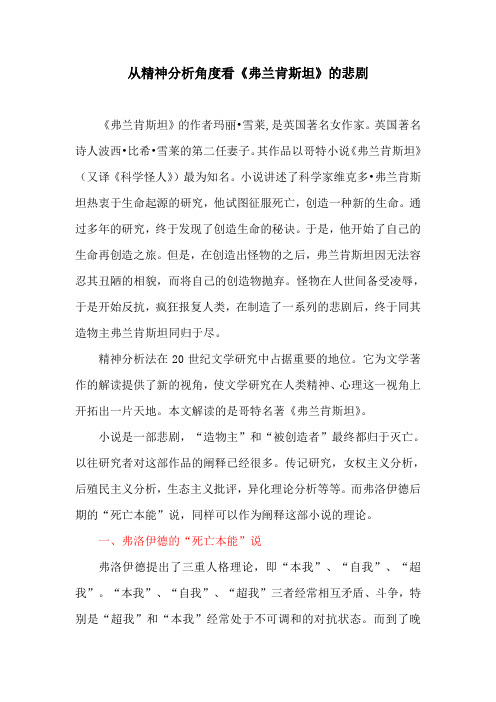
从精神分析角度看《弗兰肯斯坦》的悲剧《弗兰肯斯坦》的作者玛丽•雪莱,是英国著名女作家。
英国著名诗人波西•比希•雪莱的第二任妻子。
其作品以哥特小说《弗兰肯斯坦》(又译《科学怪人》)最为知名。
小说讲述了科学家维克多•弗兰肯斯坦热衷于生命起源的研究,他试图征服死亡,创造一种新的生命。
通过多年的研究,终于发现了创造生命的秘诀。
于是,他开始了自己的生命再创造之旅。
但是,在创造出怪物的之后,弗兰肯斯坦因无法容忍其丑陋的相貌,而将自己的创造物抛弃。
怪物在人世间备受凌辱,于是开始反抗,疯狂报复人类,在制造了一系列的悲剧后,终于同其造物主弗兰肯斯坦同归于尽。
精神分析法在20世纪文学研究中占据重要的地位。
它为文学著作的解读提供了新的视角,使文学研究在人类精神、心理这一视角上开拓出一片天地。
本文解读的是哥特名著《弗兰肯斯坦》。
小说是一部悲剧,“造物主”和“被创造者”最终都归于灭亡。
以往研究者对这部作品的阐释已经很多。
传记研究,女权主义分析,后殖民主义分析,生态主义批评,异化理论分析等等。
而弗洛伊德后期的“死亡本能”说,同样可以作为阐释这部小说的理论。
一、弗洛伊德的“死亡本能”说弗洛伊德提出了三重人格理论,即“本我”、“自我”、“超我”。
“本我”、“自我”、“超我”三者经常相互矛盾、斗争,特别是“超我”和“本我”经常处于不可调和的对抗状态。
而到了晚年,弗洛伊德将“本我”修正为两类,“性本能”和“攻击本能”,也即“生存本能”和“死亡本能”。
“生存本能”是最广义的性本能,与个体生存和种族绵延息息相关,追求自我满足,不顾社会和他人。
“死亡本能”以破坏为目的。
弗洛伊德说:“假定远在远古,生命以一种不可思议的方式起源于无生物,那么据我们的假设,那时便已有一种本能要以毁灭生命而重复返于无机状态为目的。
有假定我们所称的自我破坏的冲突起源于这种本能,那么这个冲动便可被视为任何生命历程所不能缺少的一种死亡本能(death instinct)的表现。
精神分析批评局限性论文

浅析精神分析批评的局限性摘要:精神分析批评,作为在世界范围内影响较大的一个文学批评的流派,开辟了文学批评领域的心理学时代,对文学批评理论的丰富和发展做出了十分重大的贡献。
但与此同时,该理论也表现出了许多的缺陷和不足。
关键词:精神分析批评局限性一、忽视和贬低意识的地位和作用,呈现出十足的唯无意识论。
文学是人类实践活动的特殊方式,是社会生活在作家头脑中的反映,并受经济基础的制约,恩格斯曾经指出:“政治、法律、哲学、宗教、文学、艺术等的发展是以经济发展为基础的。
”①然而,文学创作是极具个性化和形象化的思维活动,社会因素和心理因素在文学创作活动中是不容忽视的。
而弗洛伊德确认为文学创作活动是纯粹的个人心理活动的体现,这种文学创作实践追其根本是由作家的心理需要所决定的,过分夸大了无意识的地位和作用,最终陷入了唯无意识论的泥潭之中。
弗洛伊德把把人的心理结构分为意识、前意识和潜意识(无意识),所谓意识就是人们所能感知的心理活动,它属于心理机构的表层;前意识则是连接在意识和无意识之间的“守卫”,对两者之间的内容交流起着检查筛选的作用,它可以决定无意识的内容能否进入意识的领域;而无意识就是人们一般不会被意识到的心理活动,它包含着人类最原始的本能、欲望,这些本能、欲望常常是与社会伦理道德相违背的。
后来,弗洛伊德进一步完善了这一学说,将心理结构表述为“本我”、“自我”和“超我”三部分所组成:“本我”代表的是生物性的一面,“自我”代表的是心理性的一面,而“超我”代表的是社会性的一面。
由于受到前意识和“超我”的一系列约束和制约,就导致种种本能欲望得不到满足,不得不另寻出路。
在弗洛伊德看来,作家的文学创作活动就是寻求解放被压抑欲望的最佳途径,作家创作的原动力是作家被压抑的种种本能欲望,尤其是他童年时代被压抑的俄狄浦斯情节,如此说来,作家的创作活动和普通人的白日梦十分相近,弗洛伊德在《作家与白日梦》一文中论述了文学艺术作品与创作家欲望满足的关系,他认为儿童通过游戏获得快乐,在自己的世界里达到满足,成人时游戏被停止,便以幻想即白日梦来达到同样的目的,而幸福的人是不需要幻想的,幻想只发生在不能得到满足的欲望上,“未能满的愿望,是幻想产生的动力;每个幻想包含着一个愿望的实现,并且使令人不满意的现实好转。
精神分析批评局限性论文

浅析精神分析批评的局限性摘要:精神分析批评,作为在世界范围内影响较大的一个文学批评的流派,开辟了文学批评领域的心理学时代,对文学批评理论的丰富和发展做出了十分重大的贡献。
但与此同时,该理论也表现出了许多的缺陷和不足。
关键词:精神分析批评局限性一、忽视和贬低意识的地位和作用,呈现出十足的唯无意识论。
文学是人类实践活动的特殊方式,是社会生活在作家头脑中的反映,并受经济基础的制约,恩格斯曾经指出:“政治、法律、哲学、宗教、文学、艺术等的发展是以经济发展为基础的。
”①然而,文学创作是极具个性化和形象化的思维活动,社会因素和心理因素在文学创作活动中是不容忽视的。
而弗洛伊德确认为文学创作活动是纯粹的个人心理活动的体现,这种文学创作实践追其根本是由作家的心理需要所决定的,过分夸大了无意识的地位和作用,最终陷入了唯无意识论的泥潭之中。
弗洛伊德把把人的心理结构分为意识、前意识和潜意识(无意识),所谓意识就是人们所能感知的心理活动,它属于心理机构的表层;前意识则是连接在意识和无意识之间的“守卫”,对两者之间的内容交流起着检查筛选的作用,它可以决定无意识的内容能否进入意识的领域;而无意识就是人们一般不会被意识到的心理活动,它包含着人类最原始的本能、欲望,这些本能、欲望常常是与社会伦理道德相违背的。
后来,弗洛伊德进一步完善了这一学说,将心理结构表述为“本我”、“自我”和“超我”三部分所组成:“本我”代表的是生物性的一面,“自我”代表的是心理性的一面,而“超我”代表的是社会性的一面。
由于受到前意识和“超我”的一系列约束和制约,就导致种种本能欲望得不到满足,不得不另寻出路。
在弗洛伊德看来,作家的文学创作活动就是寻求解放被压抑欲望的最佳途径,作家创作的原动力是作家被压抑的种种本能欲望,尤其是他童年时代被压抑的俄狄浦斯情节,如此说来,作家的创作活动和普通人的白日梦十分相近,弗洛伊德在《作家与白日梦》一文中论述了文学艺术作品与创作家欲望满足的关系,他认为儿童通过游戏获得快乐,在自己的世界里达到满足,成人时游戏被停止,便以幻想即白日梦来达到同样的目的,而幸福的人是不需要幻想的,幻想只发生在不能得到满足的欲望上,“未能满的愿望,是幻想产生的动力;每个幻想包含着一个愿望的实现,并且使令人不满意的现实好转。
关于精神分析批评(五篇范文)
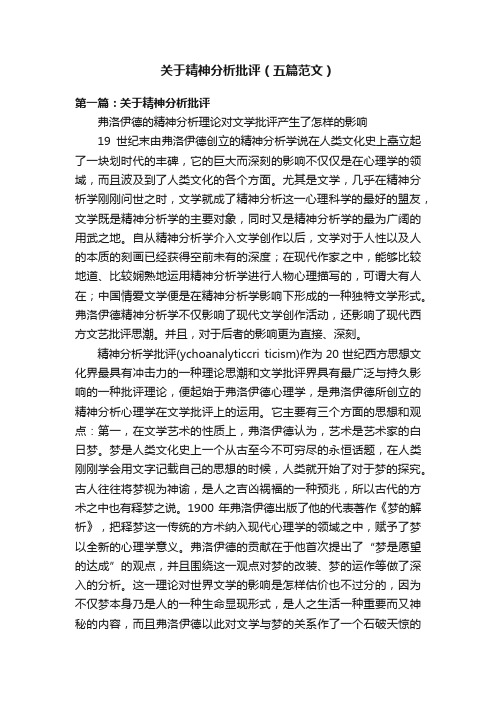
关于精神分析批评(五篇范文)第一篇:关于精神分析批评弗洛伊德的精神分析理论对文学批评产生了怎样的影响19世纪末由弗洛伊德创立的精神分析学说在人类文化史上矗立起了一块划时代的丰碑,它的巨大而深刻的影响不仅仅是在心理学的领域,而且波及到了人类文化的各个方面。
尤其是文学,几乎在精神分析学刚刚问世之时,文学就成了精神分析这一心理科学的最好的盟友,文学既是精神分析学的主要对象,同时又是精神分析学的最为广阔的用武之地。
自从精神分析学介入文学创作以后,文学对于人性以及人的本质的刻画已经获得空前未有的深度;在现代作家之中,能够比较地道、比较娴熟地运用精神分析学进行人物心理描写的,可谓大有人在;中国情爱文学便是在精神分析学影响下形成的一种独特文学形式。
弗洛伊德精神分析学不仅影响了现代文学创作活动,还影响了现代西方文艺批评思潮。
并且,对于后者的影响更为直接、深刻。
精神分析学批评(ychoanalyticcri ticism)作为20世纪西方思想文化界最具有冲击力的一种理论思潮和文学批评界具有最广泛与持久影响的一种批评理论,便起始于弗洛伊德心理学,是弗洛伊德所创立的精神分析心理学在文学批评上的运用。
它主要有三个方面的思想和观点:第一,在文学艺术的性质上,弗洛伊德认为,艺术是艺术家的白日梦。
梦是人类文化史上一个从古至今不可穷尽的永恒话题,在人类刚刚学会用文字记载自己的思想的时候,人类就开始了对于梦的探究。
古人往往将梦视为神谕,是人之吉凶祸福的一种预兆,所以古代的方术之中也有释梦之说。
1900年弗洛伊德出版了他的代表著作《梦的解析》,把释梦这一传统的方术纳入现代心理学的领域之中,赋予了梦以全新的心理学意义。
弗洛伊德的贡献在于他首次提出了“梦是愿望的达成”的观点,并且围绕这一观点对梦的改装、梦的运作等做了深入的分析。
这一理论对世界文学的影响是怎样估价也不过分的,因为不仅梦本身乃是人的一种生命显现形式,是人之生活一种重要而又神秘的内容,而且弗洛伊德以此对文学与梦的关系作了一个石破天惊的界定:文学是作家的白日梦。
简析精神分析文艺学研究
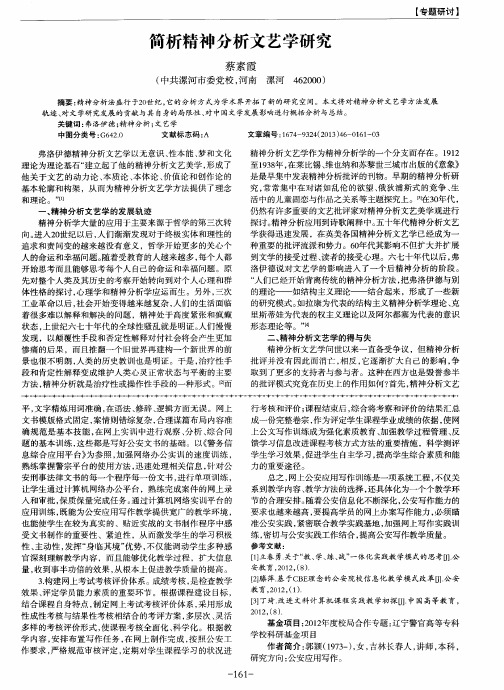
文 章编 号 : 1 6 7 4 — 9 3 2 4 ( 2 0 1 3 ) 4 6 — 0 1 6 1 — 0 3
弗洛伊德精神分析文艺学以无意识 、 性本能 、 梦和文化 理 论 为 理论 基石 “ 建立 起 了他 的精 神 分析 文 艺美 学 , 形 成 了 他关于文艺的动力论 、 本质论 、 本体论 、 价值论和创作论的 基 本 轮廓 和 构架 ,从 而 为精 神 分析 文艺 学 方法 提供 了理念
【 专题研讨】
简析精神 分析 文艺学研究
蔡素霞
( 中共漯 河 市委党 校 , 河南 漯河 4 6 2 0 0 0 )
摘要 : 精神 分 法盛行 于2 O 世 纪, 它的分析方式为学术界 开拓 了新的研究空间。本 文将对精神分析 - , t . g学方法发展 轨迹 、 对文学研究发展 的贡献与其 自身的局 限性 、 对 中国文学发展影响进行概括分析与总结。
・
+
一 +
- + 一 +
一 +
n +
一 +
” +
一 + 一 +
一 +
一 + ” +
一 +
“ +
“ +
” +
平, 文字精炼用词准确 , 在语法 、 修辞、 逻辑方面无误 。网上 文书模版格式 固定 , 案情则错综复杂, 合理谋篇布局 内容准 确规范是基本技能 , 在网上实训中进行观察 、 分析 、 综合 问 题的基本训练 , 这些都是写好公安文书的基础。以《 警务信 息综合应用平台》 为参 照 , 加强 网络办公实训的速度训练 , 熟 练掌 握警 宗 平 台的使 用 方法 , 迅速 处 理相 关信 息 , 针对 公 安刑 事 法律 文 书 的每一 个 程序 每 一份 文 书 , 进行 单 项训 练 , 让学 生 通过 计 算机 网络办 公平 台 ,熟 练完 成 案件 的网上 录 入和审批 , 保质保量完成任务。 通过计算机网络实训平台的 应用 训 练 , 既 能 为公 安应 用 写作 教学 提 供宽 广 的教 学 环境 , 也 能使 学生 在 较为 真 实 的 、贴 近 实战 的文 书 制作 程 序 中感 受文 书 制作 的重要 性 、紧 迫性 ,从 而 激发 学 生 的学 习积 极 性、 主动性 , 发挥“ 身临其境” 优势 , 不仅能调动学生多种感 官深刻理解教学内容 ,而且能够优化教学过程 ,扩大信息 量, 收 到事 半 功倍 的效 果 , 从根 本上 促 进教 学 质量 的提高 。 3 . 构建 网上考试考核评价体系。 成绩考核 , 是检查教学 效果 、 评定学员能力素质的重要环节 。根据课程建设 目标 ,
在精神分析解构下的《西厢记》
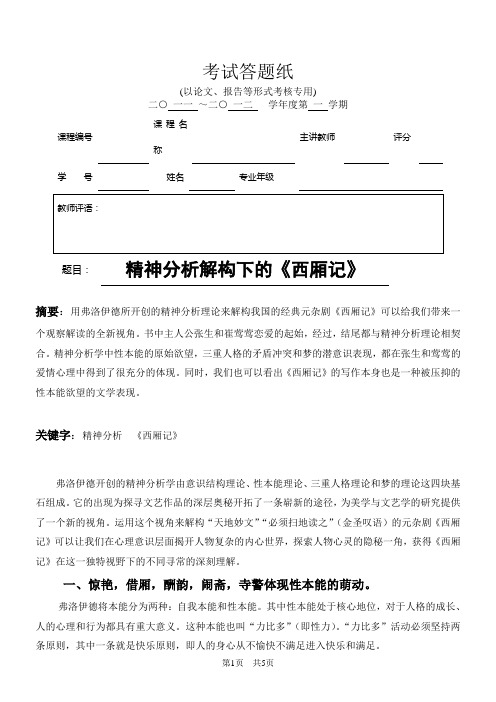
考试答题纸(以论文、报告等形式考核专用)二○一一~二○一二学年度第一学期课程编号课程名称主讲教师评分学号姓名专业年级题目:精神分析解构下的《西厢记》摘要:用弗洛伊德所开创的精神分析理论来解构我国的经典元杂剧《西厢记》可以给我们带来一个观察解读的全新视角。
书中主人公张生和崔莺莺恋爱的起始,经过,结尾都与精神分析理论相契合。
精神分析学中性本能的原始欲望,三重人格的矛盾冲突和梦的潜意识表现,都在张生和莺莺的爱情心理中得到了很充分的体现。
同时,我们也可以看出《西厢记》的写作本身也是一种被压抑的性本能欲望的文学表现。
关键字:精神分析《西厢记》弗洛伊德开创的精神分析学由意识结构理论、性本能理论、三重人格理论和梦的理论这四块基石组成。
它的出现为探寻文艺作品的深层奥秘开拓了一条崭新的途径,为美学与文艺学的研究提供了一个新的视角。
运用这个视角来解构“天地妙文”“必须扫地读之”(金圣叹语)的元杂剧《西厢记》可以让我们在心理意识层面揭开人物复杂的内心世界,探索人物心灵的隐秘一角,获得《西厢记》在这一独特视野下的不同寻常的深刻理解。
一、惊艳,借厢,酬韵,闹斋,寺警体现性本能的萌动。
弗洛伊德将本能分为两种:自我本能和性本能。
其中性本能处于核心地位,对于人格的成长、人的心理和行为都具有重大意义。
这种本能也叫“力比多”(即性力)。
“力比多”活动必须坚持两条原则,其中一条就是快乐原则,即人的身心从不愉快不满足进入快乐和满足。
在“惊艳,借厢,酬韵,闹斋,寺警”此四折中,莺莺的内心矛盾主要表现为青春性本能的欲望由窒息昏睡到萌动后的精神苦闷。
从一开始,作者就让莺莺有了一系列的不满足不快乐,性本能处于被压抑的前意识(能在一定条件下转化为意识的潜意识)状态。
父死重孝在身,处于佛门清净之地,已许为郑恒之妻,且受到母亲的严厉管辖和拘禁。
但是内心已有了少女朦胧的情愫,面对春光已有了难以言喻的愁思,发出了“花落水流红,闲愁万种,无语怨东风”的伤春之感。
浅述中国现代文学中的精神分析美学
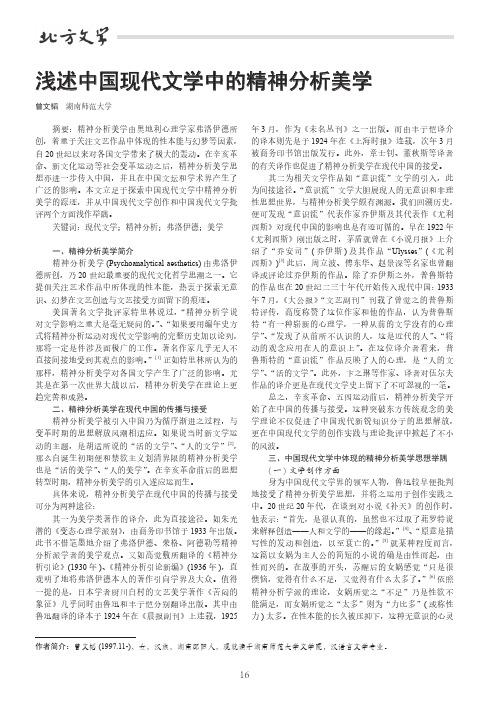
16浅述中国现代文学中的精神分析美学曾文韬 湖南师范大学摘要:精神分析美学由奥地利心理学家弗洛伊德所创,着重于关注文艺作品中体现的性本能与幻梦等因素,自20世纪以来对各国文学带来了极大的轰动。
在辛亥革命、新文化运动等社会变革运动之后,精神分析美学思想亦进一步传入中国,并且在中国文坛和学术界产生了广泛的影响。
本文立足于探索中国现代文学中精神分析美学的踪迹,并从中国现代文学创作和中国现代文学批评两个方面浅作举隅。
关键词:现代文学;精神分析;弗洛伊德;美学一、精神分析美学简介精神分析美学(Psychoanalytical aesthetics)由弗洛伊德所创,乃20 世纪最重要的现代文化哲学思潮之一。
它提倡关注艺术作品中所体现的性本能,热衷于探索无意识、幻梦在文艺创造与文艺接受方面留下的痕迹。
美国著名文学批评家特里林说过,“精神分析学说对文学影响之重大是毫无疑问的。
”、“如果要用编年史方式将精神分析运动对现代文学影响的完整历史加以论列,那将一定是件涉及面极广的工作。
著名作家几乎无人不直接间接地受到其观点的影响。
”[1]正如特里林所认为的那样,精神分析美学对各国文学产生了广泛的影响。
尤其是在第一次世界大战以后,精神分析美学在理论上更趋完善和成熟。
二、精神分析美学在现代中国的传播与接受精神分析美学被引入中国乃为循序渐进之过程,与变革时期的思想解放风潮相适应。
如果说当时新文学运动的主题,是胡适所说的“活的文学”、“人的文学”[2],那么自诞生初期便和禁欲主义划清界限的精神分析美学也是“活的美学”、“人的美学”。
在辛亥革命前后的思想转型时期,精神分析美学的引入遂应运而生。
具体来说,精神分析美学在现代中国的传播与接受可分为两种途径:其一为美学类著作的译介,此为直接途径。
如朱光潜的《变态心理学派别》,由商务印书馆于1933年出版。
此书不惜笔墨地介绍了弗洛伊德、荣格、阿德勒等精神分析派学者的美学观点。
又如高觉敷所翻译的《精神分析引论》(1930年)、《精神分析引论新编》(1936年),直观明了地将弗洛伊德本人的著作引向学界及大众。
毕业论文(文学)__从弗洛伊德、拉康到麦茨:发展中的“凝缩”——从精神分析学到第二电影符号学

首先,从凝缩这一概念入手来研究精神分析理论的方式还没有人尝试,就 系统地对凝缩进行探讨这一方面而言,凝缩似乎一直是一个被忽视的概念。凝 缩这一概念出现在弗洛伊德、拉康和麦茨三者的理论体系之中:凝缩首先出现 于弗洛伊德的《释梦》中,英译本《释梦》中凝缩被译作condensation。1拉康 继续使用了弗洛伊德发现的凝缩概念,德文Verdichtung,意为凝缩。2麦茨《想 象的能指》一书的英译本中,凝缩的英文索引是condensation。3拉康和麦茨使
possessed of language structure,was the discourse of others,thus endowing it with
philosophical foundation.Matz,as a theoretician of cinema,combined depth
interpretation of dreams.which attracted the world’S foCUS and initiated the further study about unconsciousness.Lacan was the major contributor who pushed the development of the theory of unconsciousness.He claimed that unconsciousness Was
凝缩在弗洛伊德的无意识理论之中显然是一个核心性的概念,作为梦的工 作的主要构成部分,对梦的形成起着重要的作用。那么在弗洛伊德无意识理论 发展过程中凝缩有没有发生变化昵?还有没有人继续对之进行讨论呢?从弗洛 伊德到拉康,无意识理论发生了很大的变化,凝缩也由弗洛伊德意义上的凝缩 发展到了拉康意义上的凝缩。国内学者还是认识到了拉康的无意识理论相较于 弗洛伊德发生的变化,其中凝缩的变化已经被大多数学者所认识,但是很少有 人深究其中变化的原因,或进一步思考凝缩继续发生的变化。麦茨没有将精神 分析理论推向一个更深的层次,但他将精神分析理论纳入了自己研究的领域一 一电影领域,这无疑是对精神分析学的应用与开拓,从他对凝缩的改造就可以 感受到这一跨越。这样,凝缩就以另一副面孔出现于电影符号学中引起了学界 的注视。以凝缩来论述弗洛伊德、拉康和麦茨三者理论发生的变化,中间涉及 了三个人,三个理论阶段,三种理论发生变化的原因,三种理论发生变化的结 果,三种理论发生变化所带来的影响,这一连串的思考都是我将要展开的论述。 穷根究源的阐述从而呈现一个概念的发生史、发展史以及影响史。这种线性发 展描绘会给我们一个概念的历史坐标,以及发展变化曲线的图示,还会展现它 与其他思想理论的联系脉络。思想理论本来就不是孤立的思想本身,错综复杂 地交接在一起的思想理论是更正常的事情,所以我们研究一条理论的发展线索 的过程中,不应孤立地看一种思想的衍变,发现和体会不同的思想理论的渗透 融合是我们不可回避的现实。从这一点来说,论述一个概念或讲述一种理论体 系并不是我们终极的任务,理清多种理论的交错融合才是我们更大的发现。
从精神理看爱伦·坡短篇小说恐怖美论文
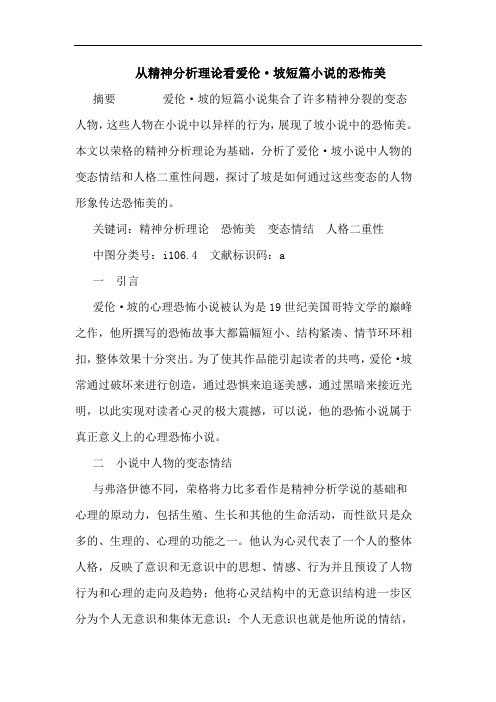
从精神分析理论看爱伦·坡短篇小说的恐怖美摘要爱伦·坡的短篇小说集合了许多精神分裂的变态人物,这些人物在小说中以异样的行为,展现了坡小说中的恐怖美。
本文以荣格的精神分析理论为基础,分析了爱伦·坡小说中人物的变态情结和人格二重性问题,探讨了坡是如何通过这些变态的人物形象传达恐怖美的。
关键词:精神分析理论恐怖美变态情结人格二重性中图分类号:i106.4 文献标识码:a一引言爱伦·坡的心理恐怖小说被认为是19世纪美国哥特文学的巅峰之作,他所撰写的恐怖故事大都篇幅短小、结构紧凑、情节环环相扣,整体效果十分突出。
为了使其作品能引起读者的共鸣,爱伦·坡常通过破坏来进行创造,通过恐惧来追逐美感,通过黑暗来接近光明,以此实现对读者心灵的极大震撼,可以说,他的恐怖小说属于真正意义上的心理恐怖小说。
二小说中人物的变态情结与弗洛伊德不同,荣格将力比多看作是精神分析学说的基础和心理的原动力,包括生殖、生长和其他的生命活动,而性欲只是众多的、生理的、心理的功能之一。
他认为心灵代表了一个人的整体人格,反映了意识和无意识中的思想、情感、行为并且预设了人物行为和心理的走向及趋势;他将心灵结构中的无意识结构进一步区分为个人无意识和集体无意识:个人无意识也就是他所说的情结,是一种心象与意念的集合,多属于心灵分裂的产物。
创伤性的体验、情感上的困扰或道德上的冲突都会导致情结的形成;每个人都会有自己的情结,但是如果我们不能与之协调的话就会引发心理疾病。
爱伦·坡心理恐怖小说中描写的都是比较典型的变态情结和心理异常的人物,从这些变态人物的身上,读者能感受到一种诡异的恐怖美。
总体上来说,爱伦·坡心理小说中的故事主要围绕三个变态情结展开,即俄狄浦斯情结、安提戈涅情结和皮革马利翁情结。
1 俄狄浦斯情结荣格认为俄狄浦斯情结即幼儿时期的恋母情结,是从弑父娶母的野蛮时代遗传下来的原始印象。
西方现代传记文学中的精神分析

西方现代传记文学中的精神分析I. 前言在20世纪的西方文学中,传记文学的发展与精神分析理论的兴起密切相关。
自弗洛伊德的精神分析理论问世以来,这一理论逐渐成为研究个体心理和行为的重要工具。
随着时间的推移,精神分析理论不仅在心理学领域取得了重要成果,还对传记文学产生了深远影响。
本文将探讨西方现代传记文学中的精神分析现象,以期揭示传记作家如何运用精神分析理论来解读历史人物的心理世界和行为动机。
首先我们需要了解精神分析理论的基本概念和方法,弗洛伊德认为,人的行为和心理活动受到潜意识的驱动,而潜意识中的冲突和欲望是导致心理问题的主要原因。
为了揭示这些内在的心理机制,精神分析学家采用了一种称为“自由联想”的方法让患者通过自由地表达内心的想法和感受来发掘潜意识中的信息。
此外精神分析理论还强调了无意识心理的重要性,认为个体的行为和心理活动往往受到无意识因素的影响。
在传记文学中,精神分析理论为作家提供了一种新的视角来解读历史人物。
通过对历史人物的内心世界的深入剖析,作家可以揭示其行为背后的动机和心理矛盾,从而使传记作品更加丰满和立体。
同时精神分析理论也为传记作家提供了一种有效的研究方法,帮助他们更准确地把握历史人物的性格特点和心理状态。
然而精神分析理论在传记文学中的应用并非一帆风顺,一方面由于精神分析理论本身具有一定的抽象性和复杂性,使得许多传记作家在运用这一理论时感到困难重重。
另一方面由于历史事件和社会背景的不同,不同时期的历史人物可能需要采用不同的精神分析框架来进行解读。
因此如何在实际创作中灵活运用精神分析理论成为了传记作家面临的一大挑战。
西方现代传记文学中的精神分析现象是一个值得关注的研究领域。
通过对这一现象的深入探讨,我们不仅可以更好地理解传记作家如何运用精神分析理论来解读历史人物的心理世界和行为动机,还可以为今后传记文学的发展提供有益的启示。
简述传记文学和精神分析的关系首先传记文学为精神分析提供了丰富的实践素材,许多传记作家在创作过程中,通过对被传记人物的心理、情感、行为等方面的深入挖掘,将精神分析的理论应用于实际生活中,从而使传记作品具有更深刻的内涵和意义。
《精神分析学在弗洛伊德的文学作品中的应用》

《精神分析学在弗洛伊德的文学作品中的应用》1. 引言1.1 概述本文旨在探讨精神分析学在弗洛伊德的文学作品中的应用。
精神分析学作为一门心理学派别,以其独特的理论和方法,在人类思维和情感解读方面发挥着重要作用。
同时,作为精神分析学创始人之一的弗洛伊德,不仅在临床实践中运用了精神分析学,也将其应用到自己的文学创作中。
1.2 文章结构本文共分为五个部分。
首先是引言部分,对文章进行概述,并介绍文章的目的。
接下来是第二部分,简要介绍精神分析学的定义、发展以及弗洛伊德在其中所做出的贡献,并阐述了精神分析学在文学领域中的价值。
然后,第三和第四部分将通过具体案例来详细探讨弗洛伊德文学作品中精神分析学应用的方式和效果。
最后,在第五部分中进行总结,并展望未来关于该主题的研究方向。
1.3 目的本文旨在深入了解和描述弗洛伊德的文学作品中应用精神分析学的方法和效果。
通过对几个具体案例的分析,展示精神分析学在文学创作过程中所扮演的重要角色,并探讨其对于人物塑造、情节展开和潜意识解读等方面的影响。
希望本文能为读者提供一个更加深入了解弗洛伊德文学作品及其背后精神分析学思想的视角,以及为未来相关研究提供一些启示和参考。
2. 精神分析学简介:2.1 精神分析学的定义和发展:精神分析学是一门由奥地利医生西格蒙德·弗洛伊德于19世纪末创立的心理学意向。
它基于弗洛伊德对潜意识和心理冲突的理论,并通过解释梦境、误行、口述性回忆等方法来研究人类心灵的运作机制。
精神分析学认为,个体社会经验中的无意识部分对人类行为和情感产生了深远而关键的影响。
在精神分析学中,潜意识被视为隐藏和受压抑的欲望、情感和冲突的储存库。
弗洛伊德主张,通过揭示潜意识中衡量与知觉非常不同于常规思考之方式,并消除对心灵欲望及恐惧范围内重要冲击力存在之否认,可以提高个体幸福感并改善其人际关系。
2.2 弗洛伊德对精神分析学的贡献:弗洛伊德是精神分析学领域最具影响力的人物之一。
精神分析法与文学批评关系透析

精神分析法与文学批评关系透析论文摘要:本文从剖析弗洛伊德精神分析法入手,试图勾勒其不同发展阶段的思想脉络,着重论述该理论对文学批评的贡献及其主要不足。
奥地利著名学者弗洛伊德(ignlUndlreUd)是精神分析文学批评理论的创始人,他的精神分析法是l9世纪末、20世纪初发端于欧洲的西方文学思潮的两大理论奠基石之一,对这股以非理性主义为主要特征的西方思潮产生过非常深远的影响。
精神分析与文学批评有着十分密切的关系,借助该理论可以揭示文学批评领域里许多隐藏的深层次含义,为文学批评提供崭新的研究视角。
论文关键词:精神分析法文学批评弗洛伊德西方文学思潮新视角20世纪人类在政治、文化、经济、科学、技术等方面取得了空前的成就,这在一定程度促进了西方文学批评理论的发展与繁荣。
尼采、康德等哲学家从各自的世界观与方法论出发,对文学创作阐述了不同的观点与主张,成为西方文学思潮的重要思想源泉;l9世纪末、20世纪初,各种以非理性主义为主要特征的文学思潮在欧美国家粉墨登场,形形色色的批评流派精彩纷呈,形式主义、新批评理论、结构主义、现代主义、女性主义、解构论等风起云涌,潮起潮落,来去匆匆,它们以各自的方式影响着西方文坛。
在这股声势浩大的西方文学思潮中,弗洛伊德的精神分析批评以其独特而深刻的理论体系对西方文坛产生了长远的影响,在分析、解读文学作品中发挥出十分独特的作用。
由于历史的局限性,虽然该理论存在一些诸如泛性主义等不足之处,但总的束说,它对西方文学批评所做出的巨大贡献是毋庸置疑的。
1精神分析法的主要理论建树弗洛伊德精神分析法为文学与心理学架起了桥梁,人们可以从一个崭新的角度去解读文学作品。
它对文学批评的贡献是多方面的,概括起来主要有五点:(1)赋予文学意象更多的象征意义;(2)心理学概念恋父情结与恋母情结的借用与引入,开拓了文学批评家的研究视野;(3)弗洛伊德关于心理“类型模式”与“心理过程结构模式”的思想为文学批评家对作品人物进行精神分析提供了理论依据;(4)他的有关生死本能论有助于分析作品中的死亡主题;(5)他提出的人本研究方法,突破了以往剖析作家传记的传统思路框架。
浅谈精神分析理论与中国现代历史小说

浅谈精神分析理论与中国现代历史小说浅谈精神分析理论与中国现代历史小说论文关键词:精神分析理论;现代历史小说;传统文化批判;文体创新论文摘要:在精神分析理论的影响和冲击下,中国现代历史小说不仅扩大和深化了表现领域,获得了批判传统文化的理论支持和精神资源,而且改变了传统历史小说注重情节演绎的叙述模式,拓宽和丰富了历史小说的写作途径与探索空间,实现了历史小说在文体和审茭形态上的创新与多样化。
“人的解放”与“文的自觉’,是五四新文化运动和文学革命的重大历史贡献,也是中国文学走向现代化的巨大推动力。
作为现代文学的有机组成部分,历史小说同样在这双重变革的有力推助下实现了从古典形态向现代形态的根本性转换。
“人的解放”离不开西方近现代科学文化思潮的冲击和影响。
作为现代心理学的一项重要成果,精神分析理论对于:20世纪世界文学的意义非同一般。
当中国现代历史小说家将其引人自己的创作实践时,不仅使他们对于人和人性有了更为全面的理解,将笔触深人到历史人物的内心世界,去观照、发掘和展示其隐在的潜意识领域,扩大和深化了历史小说的表现空间,获得了批判传统文化的理论支持和精神资源,而且从根本上改变了历史小说在审美形态上的传统面貌,使得处于生长期的现代历史小说在文体上显得更为丰富多样,并在探索和实验中为后来者实现文体创新展示了可能性和新途径。
就此而言,从上个世纪加年代鲁迅的《补天》开始,到30年代施蟹存和李拓之的历史小说创作,那种将精神分析和历史文化透视有机结合融为一体的文学观念和创新意识,不仅使他们的创作在现代历史小说发展史上显示着鲜明的个性特色,做出了独特贡献,他们别具一格的创作实践中所凝结积累的经验教训同样需要深人总结,并值得今天的历史小说作家批判地接受。
一在中国现代历史小说中,借用精神分析学说叙述事件和塑造形象开始于鲁迅的《补天》,他试图“取了茹罗特说,来解释创造—人和文学的—的缘起。
”体着对这一理论的谙熟和题材本身的优势,鲁迅既通过小说对.人和文学的创造动机与过程作了符合现代科学认识的阐释,有利于打破国人对于人类起源和文化创造的迷信与膜拜,实现他改造国民性的启蒙主义理想,又以极为奇特的充满浪漫幻想的叙述和描写体现了作家独有的艺术个性,展示了他天马行空般的想象力和独立不依、自铸伟词的精神气度。
精神分析与文学
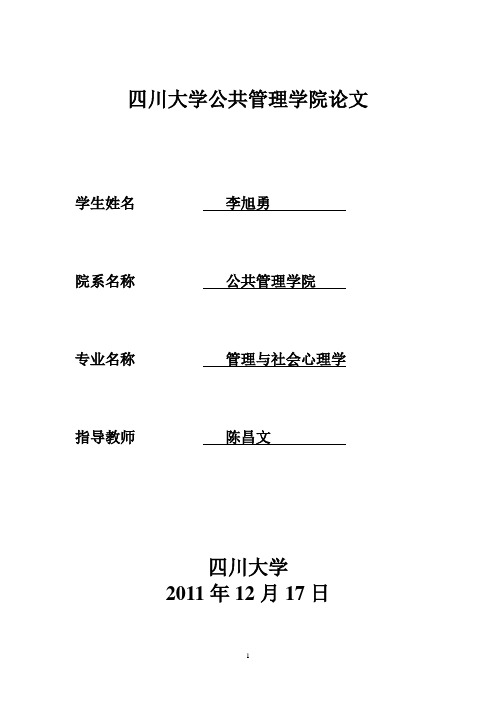
四川大学公共管理学院论文学生姓名李旭勇院系名称公共管理学院专业名称管理与社会心理学指导教师陈昌文四川大学2011年12月17日从精神分析的角度来看《呼啸山庄》一.摘要:《呼啸山庄》是艾米丽唯一的一部小说,而这部小说被认为是维多利亚时期“最奇特的一部小说”,主人公希刺克利夫的人格特点上,我们从中可以看到“本我”与“超我”最为激烈的挣扎,有人认为他是一部病态的作品,就像是一个得了精神病的患者为了报仇而不择手段一样,其实这是一种特殊环境下得特殊表现,尤其是从精神分析的角度来看这本小说的时候,就可以体会到主人公内心的煎熬,书中环境的描写以及人物与时代激烈的矛盾冲突,让我看到了“本我”,“自我”和“超我”三者之间的碰撞,这本书仿佛就在向我们展示人性中一种内在野性的释放,而这种释放和精神分析有诸多相同之处。
这种释放就是源于艾米丽对当时社会的极端愤怒。
精神分析告诉我们,我们要学会重塑人格,学会从我们的童年去找寻原因,学会接受希刺克里夫是怎样从一个正常的人到一个会为了报仇而不择手段的病态的人再到一个善良的人的过程。
我们可以从书中看到多个“自己”。
关键字:精神分析;自我;超我;本我;防御机制;性格的双重性二.观点依据1. 尽管整个故事的感情色调是抑郁的,但绝对不是病态的,我们可以从书中找到大自然给予人类最本真的快乐。
2. 画眉山庄和呼啸山庄就是“自我”与“超我”的争斗,凯瑟琳面对一个自己根本不了解和自己一点也不爱的人她自己也有两个“我”在战斗,一方面她深爱着希刺克里夫,另一方面又有一个“虚荣的我”在不断而反复的告诉她接受她不爱的人,因为这个人可以给她带来物质的满足,她自己也非常矛盾的说:这不是我原来的意思。
那她就只能是在一种无意识的状态下接受的,因为凯瑟琳的“自我”已经被画眉山庄的精神气质所改变。
3. 主人公所具有的双重性格都是在特殊环境下所造就的特殊的性格,在黑暗而没有人性的世界里,到底是什么使人们快乐,是信仰上帝,是金钱,还是纯真的爱情呢?实际上希刺克里夫的遭遇告诉了我们一个属于那个时代的真理:贫穷是可耻的!希刺克里夫在被抛弃后,他受到了凯瑟琳无条件的接纳,而这种结案恰恰就像是母亲的接纳一样,它并不会因为贫穷而有丝毫的削弱,真是这样让希刺克里夫用尽了自己一生的爱去回报,哪怕是自己的生命,以至于他完全不能接受凯瑟琳的背叛。
从精神分析的角度浅析《老人与海》
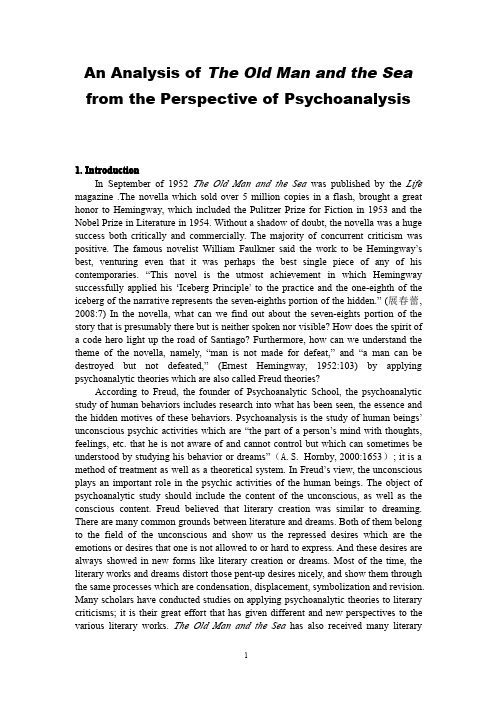
An Analysis of The Old Man and the Sea from the Perspective of Psychoanalysis1.IntroductionIn September of1952The Old Man and the Sea was published by the Life magazine.The novella which sold over5million copies in a flash,brought a great honor to Hemingway,which included the Pulitzer Prize for Fiction in1953and the Nobel Prize in Literature in1954.Without a shadow of doubt,the novella was a huge success both critically and commercially.The majority of concurrent criticism was positive.The famous novelist William Faulkner said the work to be Hemingway’s best,venturing even that it was perhaps the best single piece of any of his contemporaries.“This novel is the utmost achievement in which Hemingway successfully applied his‘Iceberg Principle’to the practice and the one-eighth of the iceberg of the narrative represents the seven-eighths portion of the hidden.”(展春蕾, 2008:7)In the novella,what can we find out about the seven-eights portion of the story that is presumably there but is neither spoken nor visible?How does the spirit of a code hero light up the road of Santiago?Furthermore,how can we understand the theme of the novella,namely,“man is not made for defeat,”and“a man can be destroyed but not defeated,”(Ernest Hemingway,1952:103)by applying psychoanalytic theories which are also called Freud theories?According to Freud,the founder of Psychoanalytic School,the psychoanalytic study of human behaviors includes research into what has been seen,the essence and the hidden motives of these behaviors.Psychoanalysis is the study of human beings’unconscious psychic activities which are“the part of a person’s mind with thoughts, feelings,etc.that he is not aware of and cannot control but which can sometimes be understood by studying his behavior or dreams”(A.S.Hornby,2000:1653);it is a method of treatment as well as a theoretical system.In Freud’s view,the unconscious plays an important role in the psychic activities of the human beings.The object of psychoanalytic study should include the content of the unconscious,as well as the conscious content.Freud believed that literary creation was similar to dreaming. There are many common grounds between literature and dreams.Both of them belong to the field of the unconscious and show us the repressed desires which are the emotions or desires that one is not allowed to or hard to express.And these desires are always showed in new forms like literary creation or dreams.Most of the time,the literary works and dreams distort those pent-up desires nicely,and show them through the same processes which are condensation,displacement,symbolization and revision. Many scholars have conducted studies on applying psychoanalytic theories to literary criticisms;it is their great effort that has given different and new perspectives to the various literary works.The Old Man and the Sea has also received many literarycriticisms all over the world.This thesis will try to apply the three related theoretical elements,i.e.,the topographical theories,the feminine psychology and the religious elements to make a brief analysis of The Old Man and the Sea.It is hoped that this psychoanalytic reading can add a new layer of charm to the literary values of this worl d–famous classic.2.A Topographical Reading of T he Old Man and the SeaTopographical reading has been used since the early development of psychoanalysis,and has developed into a rich interpretive system.It provides as well as enlarges the direction for people in reading the literary works.2.1An interpretation of Santiago’s dreams and behaviorsFreud divided the psyche of human beings into three different parts,and he took the iceberg for an example.In his reasoning,the psyche of human beings is just like an iceberg which floats in the sea.The part on the surface is the various psychic activities that we can see and feel.And it belongs to the field of the conscious.The primary part hidden under the water is invisible and that is what we can not be aware of,so we call this part the field of the unconscious;between them is the field of the preconscious.And he then called this separation of human beings’psyche as Psychical Topography which is further developed and summed up by his successors into Topographical Theory.Topographical Theory System has borrowed the word “Topographical”from the geological terms to describe the psychic activities of human beings which consist of the conscious,the pre-conscious and the unconscious,as can be shown in the following chart:After we read The Old Man and the Sea,we know that Santiago’s dreams play an important role in this novella.As we have talked in the introduction,the unconscious can sometimes be understood by studying people’s dreams or behaviors.The descriptions of the psychological dreams and physical behaviors are an importantforce in promoting the characterization of Santiago,and thus express his personal desir e—to possess the undefeated super power.2.1.1Santiago’unconscious desires from the dreamsWe often dream both in our sleep time and day life.What can we find out from a dream?How to interpret it?And why do people dream it?These are very important questions that human beings desire to resolve.“Dreams are a succession of images, thoughts,or emotions passing through the mind during sleep.”(http://en.wikipedia. org/wiki/Dream)Freud viewed dreaming as a kind of indispensable activity in our mind.Even when we are sleeping,we keep working both physically and mentally. The dreams can keep a psychological balance in our lives.If we are forbidden to dream,we will fall ill.And the dream itself is the representation of the pent-up content.To Freud,only the unconscious is the true psychical reality,which is a hidden and unknown world different from the transparent world,and“dreams are the Royal Road to the Unconscious”(qtd.展春蕾,2008:14)for“the dream is the embodiment of the instinctive desire.”(Freud,2004,12)In Freud’s opinion,dream interpretation is to find the latent content from the manifest dream.His work The Interpretation of Dreams which introduces a lot of methods of dream interpretation with many examples possesses a special place in the history of psychoanalysis and represents a milestone.Freud thought that there were many sources for dreams in our daily life, including the recent impressions(the experiences one has before he falls asleep), infantile experiences(impressions from one’s childhood),and the somatic sources (stimulus from the body).These sources constitute the main elements of dreams.We can find the old man’s motives of dreams more comprehensible after we know about the sources.As we talked above,dreams played an important role in Santiago’s life.There are six dreams in the novella,four of which are about the lions on the beach,the other two concerning porpoises and the village that Santiago lived respectively.In my opinion,the lions represent Santiago’s fighting spirit of never yielding and his positive attitude towards life.Additionally,the porpoises and the village indicate that the relation is not only harmonious but also dynamic and struggling between the humans and the animals,the humans and nature.Santiago believed that the essence of struggling is not to succeed but rather in the process of struggle itself that a real man should undertake.At the narrative level of the novella,we find that Santiago’s dreams are full of the unconscious desires.His motives are wishes.Dreams are the stretch of human psychic life,however,we can not be conscious of what the latent dream–contents are before analyzing the manifest dream-contents by using the methods of dream interpretation.To begin with,three types of dreams will be discussed in the following:(1)The dreams of lionsThere are four lion dreams in the novella,such as“He only dreamed of places now and of the lions on the beach.They played like young cats in the dusk and he loved them as he loved the boy.”(Ernest Hemingway,1952:25)As we know,the lion is regarded as the king of beasts,which means it is at the top of the animal hierarchy.The lion is power and strength.Dreaming the lion means Santiago’s pursuit for authority and honor.“People change the unconscious and existing mind into a set of sensuous video or visual scene unconsciously”(Freud,2004:13),because the old man’s pursuit exists deeply in his heart,he dreams lions repeatedly.And his pursuit is known as the unconscious desire.The dreams reflect the strong desire that he wanted to escape from lonely and poor life which is the worst form of bad luck,and the desire that he wanted to be the king of all the fishermen or to be a champion again.He would never be defeated whether he was old or not.The dream of lions comes from the second one of dream sources,the early impressions of Santiago’s childhood,for he told Manolin that“When I was your age I was before the mast on a square rigged ship that ran to Africa and I have seen lions on the beaches in the evening.”(Ernest Hemingway,1952:22)Because of the pursuit of being a king,he dreamed the lions and expressed his desires through fetching up his infantile experiences and converting them to the dreams.If Santiago wanted to be the champion or the king,why not dreamed he was the king instead of lions?According to Freud’s idea,the dream is the disguised fulfillment of a repressed wish.The dream can be distorted by unconscious force.However,Santiago was never aware of this unconscious desire.The reason he dreamed the lions is that the unconsciousness has brought his desire into the psychic. By personality Santiago was brave,confident,and optimistic,not letting anything in life defeat him.The dreams of lions show us the indomitable will of the old man who would never bend the neck to the fate.In other words,it’s the spirit of a code hero who is undefeated.(2)The dream of porpoisesAfter two days’fishing,Santiago“did not dream of the lions but instead of a vast school of porpoises……and return into the same hole they had made in the water when they leaped.”(Ernest Hemingway,1952:81)According to the story,Santiago saw the porpoises in the previous night;therefore,this dream is the reflection of the recent and indifferent impression which is the first kind of source.As we know,lions are viewed as the king,and Santiago’s dreams about them have shown the pursuit that he wanted to be a champion.But what can we find out from his dream of porpoises? The porpoises are intelligent animals and their friendly appearance and playful attitude have made them popular in human culture.They can understand the commands and information from the human beings and always behave heroically.The dream of porpoises reveals the good nature of the old man.Though Santiago was a typical code man,he was also the good guardian of animals.The old man considered that the existence of life alone was not the most important in one’s life,but the existence of great personality was the foremost thing for code men.This dream is also the interaction between the impression and the desire.He believed that the porpoises were good and“they play and make jokes and love one another.”(Ernest Hemingway, 1952:48)As we have talked,the old man was lonely,thin and gaunt,moreover,he needed love and care,but he got no friends besides the boy.He sympathized with the birds and asked them to stay at his house if they liked.He regarded the birds and the porpoises as his friends.He said:“They are our brothers like the flying fish.”(Ernest Hemingway,1952:48)This dream also shows us another Freud’s principle of dreams,that is,“the non-fulfillment of one wish signifies the fulfillment of another.”(Freud, 1997:59)This dream shows us both Santiago’s desire of making friends and his kindhearted care to the lives.Losing Manolin’s company made Santiago feel isolated and lonely;however,he refused to be defeated.As a code man,he showed us another aspect of the great human natur e—the benevolent value toward life.(3)The dream of the villageAfter he dreamed the porpoises,he dreamed his village.“He was in the village on his bed and there was a norther and he was very cold.”(Ernest Hemingway, 1952:81)This dream reveals Santiago’s strong desire to return to the village where he lived.On one hand,after two days of fishing and without sleeping,his body actually had reached its limits,and his body was in rebellion against fatigue and expressing the fatigue by the form of dreaming,hoping to go back to the village and have a good rest as soon as possible.On the other hand,dreaming of returning to the village indicates that he desired to extricate himself from the situation of being alone in the sea. However,his self-esteem did not allow him to go back to the village without catching a big fish;therefore,he put his desire to go home in the dream unconsciously.As a code man,he was undefeated;he also wanted to prove the super ability of him so that the other fishermen would not play jokes on him.In some sense,we are free when we are sleeping,and our dreams are not the realistic behaviors but the subjectivity of the unconscious.When we fall asleep,we don’t need to take part in the battle for life,to conquer or defend.We can feel the world more truly in our dreams.Santiago expressed his desires and pursuits through the form of dreams.Though the situation about the old man was poor,his unyielding spirit would never fall down which exactly reflects the essential spirit of a code hero. He was not a strong man physically,but definitely a strong man psychologically.2.1.2Santiago’s unconscious desires from the behaviorsAfter we read the novella,we find that a lot of behaviors of the old man help express his unconscious desires much more obviously than dreams,especially the words the man said.For example,when the boy and the man talked about the baseball, the man said:“The Yankees cannot lose,”(Ernest Hemingway,1952:17)and“in the American League it is the Yankees as I said.”(Ernest Hemingway,1952:21) From the above words,we can understand Santiago’s desire easily.Were the Yankees in his mind always the winner?What did he think when he heard the news of DiMaggio’s failure?There is no doubt that the news was nothing to him.For he said:“That means nothing;the great DiMaggio is himself again.”(Ernest Hemingway, 1952:21)In his unconsciousness,he was DiMaggio,and DiMaggio was him.He thought that one failure meant nothing for man could never be defeated.And the thought coincided with the theme of the novella.Briefly,the dream itself is a symbolic language;moreover,it is a kind of unconscious language conveying the desires into a set of visual pictures which form a dream.Santiago fulfilled his expectations through dreaming the lions,the porpoises and the village where he lived.Additionally,the name DiMaggio also symbolizes the old man’s undefeated spirit,i.e.,the name bears the weight of Santiago’s unconscious desires.2.2An object relation study of Santiago and his objectsThe word“object”was firstly used by Freud when he discussed the instinctive drive and the early relationship between mother and baby.What he discussed was only related to some sort of satisfaction of instinctive needs from the aspect of psychodynamic which is“the systematized study and theory of the psychological forces that underlie human behavior,emphasizing the interplay between unconscious and conscious motivation.”(/wiki/Psychodynamics)For Freud,an instinct is an inborn complex behavior of a living organism that is not learned,and it is a psychological sign of the body’s physical status.It is also an expression of human beings’psychological need.The instinct theory includes the life instinct and the death instinct which can be implied through the objects.The objects are the goals which are able to meet the instinctive needs.It can be the human beings as well as things.In the broad sense,the object is some specific man or thing that the individual emotion or drive points to.Followers of Freud have generalized the relation into what is called Object Relation Theory.In the frame of this theory,the object is the corresponding concept of the subject and the person some individual dreams or behaviors point to.Briefly,Object Relation Theory is a theory which studies how to develop the relationships and the inner psychic structure from the past relationships and the perspective of psychoanalysis.The“objects”of the theory are both real specific others in one’s world and one’s abstract internalized images of others.This part will discuss the relationships between Santiago and his objects from the two aspects of the instinctive theory.2.2.1The life instinctFor Freud,the life instinct is the desire to create life and favors construction, such as physical instincts like hunger and thirst,and psychological needs like emotions.(1)WaterDuring the fishing,the old man“was thirsty too and he got down on his knees and…..He opened it and drank a little.”(Ernest Hemingway,1952:46)The example shows us Santiago’s instinct of hunger and thirst which belongs to the low-level instinctive needs,the normal physiological satisfaction and his desire to survive.Man struggle for survival in different circumstances.Though Santiago was old,he still struggled against the fate;he refused to bend his neck to any difficulties.(2)The birdWhen the bird stood at the boat,the old man said:“stay at my house if you like, bird,I am sorry I cannot hoist the sail and take you in with the small breeze that is rising.But I am with a friend.”(Ernest Hemingway,1952:55)The bird satisfied the old man from the aspect of the emotional needs which is the high-level instinctive need to the human.Furthermore,the emotional needs which are important components of the instinctive needs are included in the life instinct.They also meet with the old man’s demand for love or emotional needs.After we read the novella,we know that the old man had a strong desire to escape from the lonely and unlucky life. Can he achieve the desire and how?In fact,he knew that it’s difficult for him to carry out his desire,but he still hoped that his dream could come true one day.Without theManolin’s company,he felt lonely;however,it did not mean that he was defeated.To Santiago,the life was a struggle to be borne.As a code man,he knew how to change his mindsets,so he viewed the bird as a friend especially when he was alone in the sea.(3)Manolin and the other fishermenWhen Santiago went far away from the village,he said:“I wish I had the boy”(Ernest Hemingway,1952:45)for six times in the whole novella.“Whenever the boy rises in Santiago’s thoughts,he is filled with confidence and strength to struggle.”(蔡文,2003:39)In some sense,Manolin is the specific person that the old man’s emotion or drive points to.The boy made Santiago’s emotional needs come true.The old man had taught the boy to fish and the boy loved him as the old man thought.The old man also said:“the boy keeps me alive.”(Ernest Hemingway,1952:106)The relationship between the boy and the man is not only the relationship of parents and son,but also the equivalent relation.Manolin is not merely a boy in some sense,he is the best fan of the old man,and also he is the youth of the man.He brings back the youth that the old man has lost.Manolin is not only Santiago’s genuine friend,but also his hope and future.More importantly,Santiago’s love for the boy stimulates him to be stronger and more confident.The fishermen in the village are also the objects to Santiago.After40days without a fish,the boy’s parents told him that the old man was now definitely and finally salao,which is the worst form of bad luck.And they took the boy away to another lucky boat.Some fishermen thought Santiago was a loser.Even at the end of the novella,the old man said:“There is only the boy to worry.”(Ernest Hemingway, 1952:115)The sentence reflects the cold attitude of other fishermen in treating the old man.The old man believed that only the boy’s love was true.However,he also considered that“Many of the older fishermen will worry.Many others too.”(Ernest Hemingway,1952:115)Here he used the word“will”,denoting that though he was not sure if other fishermen were worried about him,he expected that they were kind and would love him.He even thought he lived in a good town.These fishermen also became the external existence where the old man balanced his psychology in both emotional losing and receiving.The other fishermen’s barbed remarks did not force Santiago to lose his self-confidence.Though the other fishermen did not really concern with the old man,they filled the emptiness inside him.To some extent,they drove away Santiago’s loneliness.2.2.2The death instinctThe action of fishing is also one of Santiago’s objects and it concerns with the other aspect in the Instinctive Theory which is the death instinct.For Freud,“the target of all lives is death.”(沈德灿,2003:71)Everyone has a death target and an instinct of going back to the condition of nonliving and inorganic matters.The death instinct represents a drifting force which is a kind of destructive,invasive force and lurks in the lives of human beings.The death instinct is a kind of opposite strength to the development of lives,such as destruction,attack and provocation.In The Old Man and the Sea,the old man was not allowed to go fishing alone in the open ocean for both his age and physical condition,but he insisted on fishing so big a marlin that hehad never seen in the place where he never went,to challenge his personal limits.The frail body can better show Santiago’s iron will.To some extent,it reflects the adventurous spirit of the old man.Adventure is equivalent to seeking death,and it is the specific manifestation of the death instinct.When he struggled against the sharks and said:“Never have I seen a greater,or more beautiful……Come on and kill me.I do not care who kills who”(Ernest Hemingway,1952:92),we have seen both the calmness that the old man showed us when he faced death and the human beings’death instinct through the dangerous action of fishing.The life instinct and the death instinct can sometimes be interchangeable. Santiago“was further out than he had hoped to be.”(Ernest Hemingway,1952:30)He knew it’s dangerous to go far out of sea,but insisted on working far out.This shows his adventurous spirit when the death instinct is brought into full play.Meanwhile during the period of fishing the marlin,there exists a transformation between the life instinct and the death instinct.In his words“I could not fail myself and die on a fish like this”(Ernest Hemingway,1952:87),we can find his pursuit of survival.And at last,he killed the fish in self-defense.As stated above,we know that the individuals can express their desires through the objects no matter what they ar e—humans or things.3.Feminine Psychology in the Sea“Feminine psychology is a term sometimes used to describe and categorize issues concerning the gender related psychology of female human identity,and it emphasizes gender differences and has a scientific and empirical approach,is more closely aligned to the psychoanalytic tradition,pioneered by neo-Freudian Karen Horney.”(/wiki/Feminine_psychology.)Freud considered that it’s impossible for men and women to enjoy the equal rights.On the one hand,he agreed with the idea of the feminism when women supported his theories,thinking that women should have some equal rights to study psychoanalysis.On the other hand, he opposed the feminism when women declared that they wanted to compete with men.He held conflicting ideas towards the feminism.In the novella,Santiago “always thought of the sea as la mar which is what people call her in Spanish when they love her”and“The old man always thought of her as feminine and as something that gave or withheld great favours,and if she did wild or wicked things it was because she could not help them.”(Ernest Hemingway,1952:29)From these two sentences,we can understand the old man’s attitude towards females.He appreciated the sea as he viewed the sea as the women.“In the world of the patriarchal society, what men have to conquer is not only the bodies of women,but also their consciousness.”(王勇,2007:86)The women for Santiago were not only the conquerable objects,but also the best therapy.However,when he saw the Portuguese man–of–war,he despised it and said:“Agua mala,you whore,”(Ernest Hemingway, 1952:35)because men can be hurt by the poison,and“these poisonings from the agua mala came quickly and struck like a whiplash.”(Ernest Hemingway,1952:36)Here we also see the different attitudes of the old man when he faced different women.He loved the kind women,who gave or withheld great favours to people;meanwhile,he hated those women who hurt others.In some sense,he knew clearly what to love andwhat to hate.Santiago’’s Thoughts and Language4.Religious Elements in SantiagoThere are many common grounds between religion and psychoanalysis.Both of them pay attention to the treatments of soul and body of human beings.And what they call soul actually is mind or psyche.According to Fromm(2006,11),in different places,we call the person who pays his attention to the treatments of soul and body of human beings in different ways.In the system of religion,the person who cares the treatments of soul and body is called“priest”,and in psychoanalysis,he is called “psychoanalyst”.For Freud,the reason for producing the religion is the disability when people face the outer natural force and his own instinctive force.Many theologists also think that the senses of reliance and incapability are the core of religious experience,for people are unable to counteract the repression of the outer world,they then turn to put their dreams on the religion.They believe that the religion can meet their desires,at least mentally.After we read The Old Man and the Sea,we obviously find out that there are so many religious words in the text.There are7 places mentioning the religion,including the Sacred Heart of Jesus,the Virgin of Cobre,Our Father,Hail Mary and so on.And Santiago asked God for help for four times within the7places.For example,“God help him to take it,”(Ernest Hemingway, 1952:42)“God help me to have the cramp go,”(Ernest Hemingway,1952:60)and“I promise to make a pilgrimage to the Virgin of Cobre if I catch him.”(Ernest Hemingway,1952:65)From these examples,we can understand that the old man reposed his incapable desire to God when he felt it’s difficult to catch the fish.He thought God could help him,and then he asked.In some sense,he believed that it’s the only way to fulfill his expectation by believing in God.In the process of believing God,he tried to make himself more confident,and asked God to give what he did not have;he believed God would meet his desires.Each man needs dependence indeed, and Santiago regarded God as his reliance.And if we read the text more minutely,we will find that there is satire in the text from the perspective of religion.In the very beginning of the novella,the boy said:“It was papa made me leave.I am a boy and I must obey him.”(Ernest Hemingway,1952:10)This sentence shows us the patriarchal system in the society which was greatly advocated by the religion.The old man said:“if Durocher had continued to come here each year your father would think him the greatest manager.”(Ernest Hemingway,1952:23)This sentence drops a hint that Santiago did not like the thought of the boy’s father,he satirized that the man was a timeserver and the whole system of the feudal patriarchy was corrupt.For he knew the system of the western religious world was based upon patriarchy.He opposed the religious system,but had to rely on it.This situation is the synthesis of contradictions, and also the poor plight of the old man.Briefly,Santiago was a lonely old man,and he tried hard to shake off this hard life.He can do nothing but relies on the religion.The religion,to some extent,is his spiritual sustenance.And where he lived was the complex of dreams and reality.5.ConclusionAs a psychoanalyst,Freud regarded the literary creation as an important activity to explore the psycho secrets of human beings.And he reduced the creative motives。
鲁迅小说的精神分析

摘要:鲁迅小说藉着独特的形式,用精神分析法,以“不和众嚣,独具我见”的思想和艺术风格,把他对人生、社会、新事物的看法和感情表现出来。
收在《呐喊》、《彷徨》、《故事新编》中的不少名篇,基本是传统小说格局和西方现代派多种技法体系的合成。
在“大团圆”框架中运用精神分析、象征、变形、隐喻……等等表现方法,恰到好处地、具有象征意义地表达了自己为新文学运动的理想而摇旗呐喊和无法找到一条正确可行路径而苦闷彷徨的心境,以及对传统、现实人世的思虑与反省。
关键词:鲁迅;精神分析;象征;变形鲁迅小说不是每一篇都写得好,而是每一篇都有新的尝试,新的探索。
藉着独特的形式,用精神分析法,以“不和众嚣,独具我见”的思想和艺术风格,把他对人生、社会、新事物的看法和感情表现出来。
收在《呐喊》、《彷徨》、《故事新编》中的不少名篇,基本是传统小说格局和西方现代派多种技法体系的合成。
如在“大团圆”框架中运用精神分析、象征、变形、隐喻……等等表现方法,恰到好处地、具有象征意义地表达了自己为新文学运动的理想而摇旗呐喊和无法找到一条正确可行路径而苦闷彷徨的心境,以及对传统、现实人世的思虑与反省。
《狂人日记》从中国传统小说的意义说,它只是一篇日记,而不是小说。
这篇作品非常简炼地表露出作者对中国传统的看法。
“狂人”患了时时被人迫害的心理病,在疑惧中他翻开了一部历史书,“这历史没有年代,歪歪斜斜的每页上都写着‘仁义道德’几个字”。
他横竖睡不着,仔细看了半夜,才从字缝里看出几个字来,满本都写着两个字:‘吃人’。
从这里可以看出,不论如何仁义道德,传统生活所代表的正是礼教吃人。
鲁迅对传统生活的虚伪与残忍的谴责,其严肃的道德意义非常明确,这是这篇作品的意义所在。
但是,这种严肃的意义鲁迅却是以主观的心态,用超现实的手法对现实作了扭曲变形的反映,从而使作品的意义更为增殖。
作品前缀的介绍是用文言文写成的:某君昆仲,今隐其名,皆余昔日在中学校时良友;分隔多年,消息渐阙。
- 1、下载文档前请自行甄别文档内容的完整性,平台不提供额外的编辑、内容补充、找答案等附加服务。
- 2、"仅部分预览"的文档,不可在线预览部分如存在完整性等问题,可反馈申请退款(可完整预览的文档不适用该条件!)。
- 3、如文档侵犯您的权益,请联系客服反馈,我们会尽快为您处理(人工客服工作时间:9:00-18:30)。
文学精神分析论文摘要弗洛伊德给予文学精神分析,认为人们的梦境能够表达被抑制的欲望,指出幻想与文学创作的联系,同时遗留“作家如何用作品达到唤起感情的效果”的问题。
试解这一遗问可以引入“盗梦”这一概念,作家可看作是精通摄梦术的“文学盗梦者”,潜入受众意识或窃取、或改变,以感染读者、唤起感情。
关键词文学精神分析弗洛伊德梦文学被人们以各种不同的角度阐释着,结构的、或现象的,一切说法皆有其合理之处。
然文学终究蕴含着人的特殊气息,如若以更靠近人的角度来解读,精神分析不失为一个合适而高妙的角度。
用精神分析来解读文学可以说是源于西格蒙德·弗洛伊德,本身作为一名医生,弗洛伊德关于文学领域的思考是他延伸的新知,而对于文学多角度的分析,他的方法也着实成为一个崭新而重大的开辟。
“精神分析法作为一种技巧,对美学领域没有什么贡献,但是,这个技巧却对20世纪的一些艺术和文学产生了极其重大——并且是常常是富有刺激性的影响。
”[1]246对文学进行精神层面的分析饱受争议,但无论精神分析是多么的备受误解、批评或指责,它却一直不可阻挡地在发展,人们无法否认它在文学领域中存在的一席之地,甚至连对立的人也无法躲避其照射的光辉。
精神分析的创始人弗洛伊德曾经乃至现在也都是个备受争议的人物,然而正如他的学说一样,那种带给人们精神上的力量是巨大的。
后人亦在其道路上不断延展与开拓,发掘了更多关于精神分析与文学的奇妙关联,不断丰富着这种精神分析的方法。
“从某种程度上,精神分析就是文学本身,两者之间的关系不过是一种互文本的游戏而已。
”文学的精神分析有着不可磨灭的合理性。
“精神分析和艺术之间的关系是相互的,彼此激发对方。
弗洛伊德的关于心灵的洞察,应该很大程度上归功于他的知识和对文学的热爱。
他经常引用歌德的和其他一些伟大的作家的文章。
作家,文学评论家和精神分析师都对语言,其象征、共鸣和关联极为关注。
弗洛伊德最初的思想是,艺术作品性呈现了压抑的婴儿愿望,他把艺术作品与白日梦联系起来。
”关于心灵的洞察,关于精神的剖析,亦是关于一个人真正的“我”的思考。
弗洛伊德把“本我”、“自我”、“超我”认定为组成人格整体的三个部分,并把它们与文学的创作相联系起来,认为那些来自人格内部的压力、精神上的压抑可以成为文学艺术创作的动力,创作中,这些压力得以发泄,三个“我”的对立统一中便产生意识与潜意识的分别。
“人类意识活动的基本部分和基本能源中心是在不为我们的意识所察觉的、潜伏在心理深层的无意识。
就在这一深层区域,包含着诸多风俗、习惯、道德、法律等规约之外的个体原始冲动、本能以及主体出生后和本能有关的欲望和各种心理创伤的‘心理书写和记录’。
弗洛伊德认为,心理结构主要部分是无意识的;无意识是人类精神生活的基础,是个较大的圆圈,它包括了‘意识’这个小圆圈”;每一次意识活动都具有一种无意识的原始阶段。
”[4]7同时,弗洛伊德又引入“梦”这一概念。
以梦阐释文学可以说就是弗洛伊德用精神分析发放解读文学的一个概括。
作为意识形态的梦与以创作实体存在的文学看似不在同一维度,但以精神分析来看,两者却有着极大的共同点,甚至有时便可以把文学比喻成作家的一场梦。
“弗洛伊德认为人类的心理活动有着严格的因果关系,梦不是偶然形成的联想,而是愿望的达成,在睡眠时,或做白日梦时,‘超我’对‘本我’的监查松懈,潜意识中的欲望绕过压制而泄露出来。
因此,梦是对清醒时被压抑的潜意识中的欲望的一种委婉表达:对梦的分析可以窥见人的内部心理,探究其潜意识中的欲望和冲突”。
[5]93他认为人的潜意识驱动着幻想(幻想亦可等同于弗洛伊德所指“白日梦”),而正是这些不便直说的幻想驱使着作家和诗人形成他们的创作,即文学作品形成。
由此,可以认为作家的作品即是作家的梦境,是作家在头脑潜意识驱动下、在精神力量的推动下编织的一个梦。
所以由梦境可以追溯一个人的心理活动、内心想法,由文学作品可以窥视作家的精神意念、被压抑的欲望。
“梦与一定类别的意识,以及一定的心灵状态有部分关联,它位于潜意识现象中模糊幽深的背景”,“梦是潜意识心理频繁又常态的表达,所以传来许多研究潜意识的经验素材”[6]135作家的某种心灵状态促使作家脑海浮现某种梦境,将梦境转变为纸质,梦中的元素便是提供了文学创作的种种素材。
“在《梦的解析》开始,弗洛伊德就做了这样一个惊人的判断:梦是一个由话语组成的谜,或称一个字谜。
他要求读者从字面意义上理解这句话的含义:即梦就是话语本身。
”梦亦就是作家的创作。
而弗洛伊德也遗留着一个问题:“至今我所能做的,只是抛出一些鼓励和建议;从研究幻想开始,谈到作家选择他的文学素材的问题。
至于另一个问题——作家如何用他的作品来达到唤起我们的感情的效果——我们现在根本还没有触及到”。
[8]99本着精神分析的原则,如果说文学艺术是作家编织的梦,那么不妨说:作家是通过“盗梦”这一手段来唤起读者的感情。
由此可回答弗洛伊德的遗问。
作家既是一个“造梦师”,他释放心中情绪、放任意识的驰骋或者故意隐藏某种心理的压抑,以天马行空的想象编造一个梦境,汇集成文学作品;作家又是一个“盗梦者”,他盗取的是自己潜意识的冲动而使之成为作品,同时,盗梦者与旁人分享梦境,由此可以探究到旁人潜意识中的秘密,甚至通过这个梦将某种意识“奠基”(或称“植入”)到分享者的头脑中,而这一过程却不被分享者所察觉。
也就是,作家可以猜及并顺应其作品读者的心思,引起读者的共鸣、引导读者的感情,乃至可以通过一部文学作品将某些意念“奠基”到读者的意识、改变原来的意识,若读者自身无法察觉到这种改变,那么这样的“奠基”便是深入到了潜意识,形成完美的“盗梦”。
作家到底是怎样的一个文学盗梦者,这个盗梦的过程及结果究竟怎样形成,应从梦的始源,即文学作品的初始创作开始分析。
文学作品的创作来源于作家的意识,而作家的意识离不开现实生活的长期影响,可以说正是现实的状态给了作家精神上的激发、创作上的冲动。
“作家正像做游戏的儿童一样,他创造出一个幻想的世界,并认真对待之。
这便是说,他倾注了丰富的情感,同时,明确地把想象的世界同现实分离开来。
语言保持了儿童的游戏同诗人的创造的这种关系。
”作家在现实中积累了情感又将情感倾注到作品的创作中,但作品并不是对于现实的完整反映,它必是以某种变了形的状态存在,就像梦虽来源于现实但内容却与之有着不小的区别。
就如弗洛伊德所说——“我们丢不掉一切,我们只是以一件事来代替另一件事”,“只不过是丢掉了游戏同实际物体的联系,而开始用幻想来取代游戏而已”。
作家的创作之梦即是如此。
从一开始,作家其实也只是一般普通人,只是他们某些方面能力的更为强大使得他们成为区别于普通人的“作家”,如非同一般的想象力以及表达这种想象的能力。
“我们这些普通人总是竭力想知道,诗人这个奇怪之物是怎样获得素材的,这正像主教向阿里奥斯托提出这个问题一样。
我们认为自己大概完全不了解,是什么东西使诗人能那样深深地打动我们,并激起我们的感情。
我们对这个问题产生兴趣,仅仅是因为这样一种情况:如果我们问起诗人这个问题,他们自己也说不清,或是不能作出满意的解释”——弗洛伊德有着这样的思考。
试着解答这个问题,大概“技巧”算的上是诗人也就是作家们区别于普通人的一大不同。
有观点指出:“弗洛伊德文艺观局限主要在于只看到了艺术家的潜意识动机,而不知道一件艺术作品的产生除了潜意识动机外还需要有艺术技巧等各方面的配合,如同样是俄狄浦斯情结的驱使,可以让人写一本乱伦的色情小说,也可以让莎士比亚创作出《哈姆雷特》那样的名著,而单一对作者潜意识的精神分析不能解释两者的区别。
”所以,虽然每个人都会有潜意识,每个人都会做梦,但并不是每个人都能成为诗人。
即便“作家自己也总是试图缩小他们那类人同普通人之间的距离,他们经常要我们确信,从本质上讲,人人都是诗人,只有当人类消亡时,诗人才会泯没”,但同是造梦者的作家与普通人终究是有分别的。
技巧,能把可能令人厌恶的白日梦境变成诱人的艺术,给人美的愉悦。
每一个人都有表述自己梦的能力,但并不是所有的梦都能成为文学作品,不是每一个人都能称为真正意义上的作家。
所以,一切盗梦的前提是作家必须先得扮演好“造梦师”的角色。
作家造梦,首先得进入睡眠状态,也便是进入一部文学作品的创作准备阶段,作家营造氛围、给予暗示,预备创作。
电影《盗梦空间》给我们以启示,进入深度的睡眠状态可能使用到“梦素”(电影中,一种让人稳定在睡眠状态不易苏醒的药物)、“造梦机”(快速催眠使人进入梦境的机器)等作为辅助。
将之与作家的创作相比,大可认为创作者所使用的“梦素”便是某些好的主题、有吸引力的观点等一切引人入胜的文学元素,这些元素让读者在不知不觉中陷入到作家所编织的梦境、沉醉于文学作品中不能自拔。
在这一过程中,作家无意地又充当了“药剂师”的角色。
而“造梦机”就像是作家构建文学作品的言语辞藻,甚至是作家手中的创作之笔。
有时候一部作品不只是一个作家的结晶,那么这样的盗梦便是由一个盗梦团队来共同完成,有分工有合作。
作家开始创作,盗梦者开始建造一个梦境。
在这个新建造的世界里,一切尽在造梦者的掌握中,而刚好,此时造梦者、盗梦者同为作者,于是所有都以作家为中心,为作家自身利益开始一个盗梦的旅程。
梦境,是作家潜意识的体现,“超我”对“本我”放松监查,所以一切在现实中的压抑在此得以释放、被现实局限的欲望在此得以满足,现实不可能的存在也肆意布满梦境,甚至到处充满悖论,不遵循现实定律,就如荷兰艺术家埃舍尔创作的无尽头的楼梯在梦境中亦可逼真地存在。
这就是作家所建造的文学作品的梦境,作家把内心的压抑、潜意识的欲望、现实羞于表达的幻想都化为如梦境一般的文学作品,在作品里就可以存在许多现实的不存在。
弗洛伊德本人把释梦和分析病症的方法首先运用于研究笑话和俏皮话的审美现象时便认为:“俏皮话形式正是取决于构造梦幻形象的形式结构的那些规律,即替换表象形成的规律。
这些规律就是指用一定方法来合理迂回的方式,即表象融合和词义融合,形象替换,词义的二重性、又一方变为另一方的转义,移情等等。
笑话和俏皮话的意向在于:回避现实性,从生活的严肃性中解脱出来,并宣泄被压抑的幼稚型本能、性欲或侵略本能。
”回避现实,一切任由作家的想象力遨游,这也解释为什么有那么多科幻的、虚构的、与现实不符的文学作品的存在,因为那就是一个梦。
而最与梦相似的是那些意识流的作品,没有秩序的存在、看似不合逻辑、由意识肆意驰骋穿越,就像人们从来都不记得梦是从何而起,往往记得的只是梦的中间部分,或是片段,胡乱而没有章法,没有逻辑地跳跃流动。
在这样的文学作品和这样的梦中,时间早已脱离了现实中的概念,无序的一切将时间打乱。
“达利的‘手绘梦像’企图捕捉梦的幻觉明澈性。
正如他在著名的绘画《记忆的永恒性》中所指出的,在做梦者的心灵中,时间像在弗洛伊德的无时间的无意识中一样凝固住了,因此,精神上的钟表变得柔软而容易弯曲,失去了功能,腐烂而招来蚂蚁,并变成了有机体的形状,像秋天的叶子一样挂在光秃秃的树枝上。
